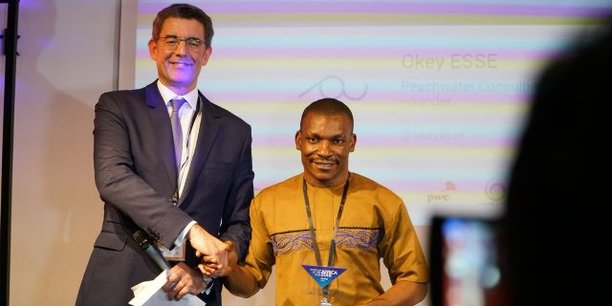At the last “Startup of the year Africa” awards ceremony, held in Casablanca earlier this year, the Nigerian startup Peachwater Consulting received the Engie Special Award for Powerstove, a wood burning stove that transforms heat produced in electricity. Adjusted for optimal combustion, its use results in a 70% reduction in biomass consumption, which allows the user to reduce both its energy bill and its carbon footprint.
Interview with Okey Esse, creator of Powerstove, a cooking oven that could soon, in addition, provide free electricity to tens of thousands of homes in Africa.
Before mentioning this special Engie prize, can you introduce your invention, Powerstove?
Okey Esse: This is the first cooking oven in the world that can also generate off-grid electricity. Part of the heat produced by the fire is converted into current, thanks to a thermoelectric phenomenon called the Seebeck effect. It works on the principle of heat differentials, which means that one side is hot and the other cold. Powerstove produces up to 50 watts continuously. Some of this electricity is used to power the Powerstove’s air injection system. But the rest can power an LED or charge a mobile phone. In addition, thanks to optimized combustion by our injection system – and its 85 air jets, Powerstove saves 70% on biomass consumption. As fuel, we recommend using charcoal or wood. And since Powerstove consumes less biomass, it produces 65% less CO2 than a conventional stove.
What was the impact of the Engie Special Award, which rewarded you in the context of “Startup of the year Africa”?
You know, we have already received several international awards. And we are very proud of it! But this special prize Engie had a special taste. Already because it was given to the “Startup of the year Africa”. This is an important ceremony in the world of startups. Being rewarded gives us, since then, much more visibility. Then, because this trophy was given to us by Engie, a big company specialized in electricity. It is a reference in this area, even if we do not do things on the same scale.
The production was to be launched in March 2018, but was postponed. What about today ?
Everything is fine ! In March, we were not ready, and preoccupied with other aspects of the project. We still wanted to perfect our technology. We had to postpone the launch in August. But now it’s really gone. Our production plant in Abuja, central Nigeria, is running well. Our goal is to get a production rate of 600 Powerstove per month. Everything is presented for the best; the order book is full, and we do not encounter major difficulties in the production phase. Our main goal now is to further reduce the Powerstove sales price. It is now $ 90, which is good, but still too high for many households.
Apart from Nigeria, have you developed Powerstove implementation projects in other African countries?
Last August, I visited Rwanda, where I met importers working in East Africa. Their network is an excellent entry point for Powerstove in this part of the continent. We are talking about tens of thousands of copies sold. We are also working on a larger oven, able to accommodate two pots. We are targeting large families and small restaurants.


Leave a Reply